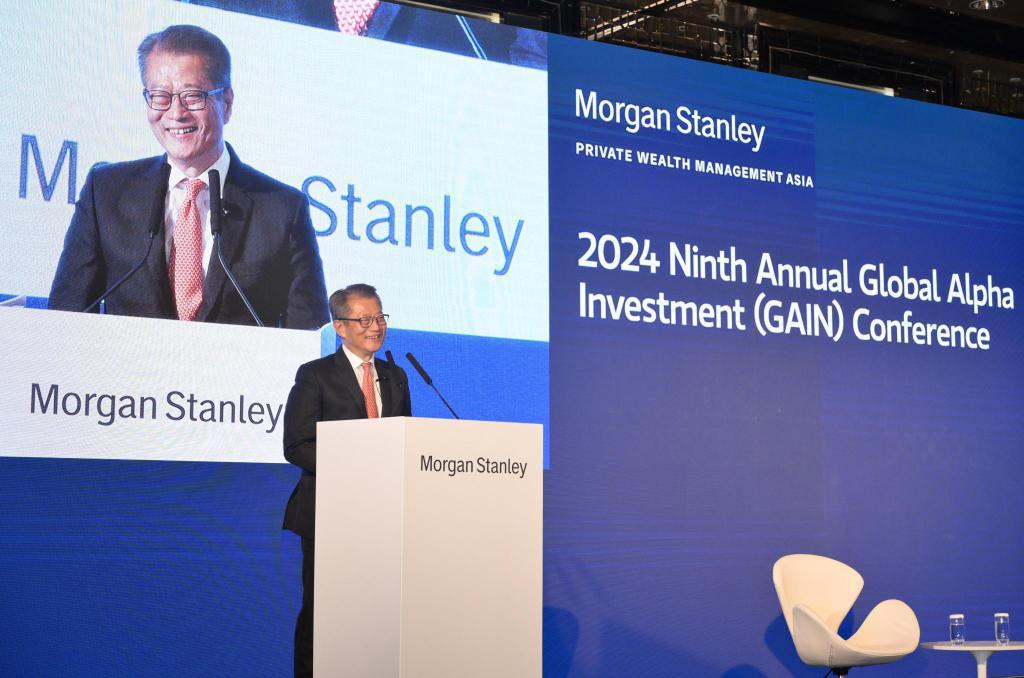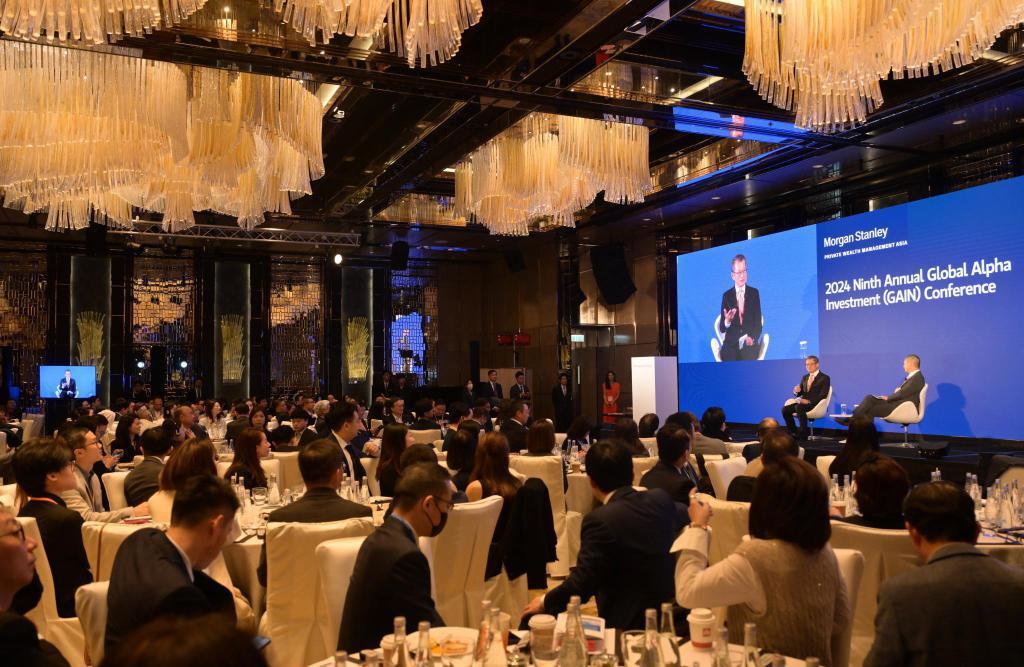Speech by FS at 2024 Ninth Annual Global Alpha Investment Conference (English only) (with photos)
******************************************************************************************
Gokul (CEO of Morgan Stanley Asia, Mr Gokul Laroia), Vincent (Head of Asia Pacific Wealth Management of Morgan Stanley, Mr Vincent Chui), distinguished guests, ladies and gentlemen,
Good morning to you all. I would like to first thank Morgan Stanley for organising this Annual Global Alpha Investment Conference in Hong Kong.
Since quite a number of you are coming from overseas, perhaps, to begin with, I should give you a quick roundup of Hong Kong's economy in 2023, and the outlook for this coming year and our vision for Hong Kong as an IFC (international financial centre).
The economic performance of Hong Kong last year goes as follows: GDP (gross domestic product) is expected to grow by about 3.2 per cent, slower than what we would have liked to see due to quite a number of reasons: the geopolitical environment, the economic adjustment on the Mainland, the actions taken by the US (United States) against our country which might interfere with capital flows.
The three drivers of economic growth include exports, investment and consumption. Export performance is a bit disappointing, having dropped by about 14 per cent in the first three quarters of 2023. This is in line with the challenging export environment faced by the Mainland, because we play a role in re-exporting for the Mainland.
Investment increased by about 8.1 per cent in the same period. Consumption, thanks to the inbound tourism as well as the relatively well employment situation in Hong Kong and income growth in general, consumption increased by about 8.9 per cent.
In terms of the asset market, property prices dropped by about 7 per cent or thereabout, but the volume of transaction remained low. Total transactions for the year 2023, first and secondary transactions included, were about 43 000. A year before, also slow, about 45 000 transactions were noted as compared to the level of 60 000 a year since 2012. We saw the drop an orderly adjustment, noting that interest rates were on the rise and remained at a high level last year. Understandably, some home owners would tend to defer their purchase decisions, and this is behind the property market's performance last year.
The stock market was down by about 14 per cent last year. Volume-wise, transactions came down to about slightly over HK$100 billion a day on average, as compared to over HK$120 billion in the year before and over HK$150 billion in 2021. In 2021, the market was good.
For employment, the unemployment rate is low, at about 2.9 per cent. Inflation was moderate, at about 2 per cent. The community as a whole is stable and recovering.
The medium-term outlook of Hong Kong is positive. First, we have the institutional strengths under the "one country, two systems" arrangement. This is guaranteed by the Basic Law. President Xi came to Hong Kong in July 2022 on the 25th anniversary of the establishment of the Hong Kong Special Administrative Region. In his important speech, he made the point about upholding Hong Kong's "one country, two systems" in the long run; he referred to the common law system more than once. That upholding the "one country, two systems" arrangement in the long run has been written into the constitution of both the Communist Party of China and the country.
Second, for this term of Government, we see ourselves as a facilitator, as well as an important driver to spur economic growth. So we won't just leave everything to the market, but we will take lead to instil confidence, and enable people to work together to grow our economy. The governing style of the Government of this term, I would say, is a lot more proactive.
Third, under the National 14th Five-Year Plan, the Central Government fully supports Hong Kong in the development in eight particular areas. Usually we call it the "eight centres": international shipping, trading, financial as well as innovation and technology centres; regional centre for international legal and dispute resolution services in the Asia-Pacific region as well as regional intellectual property trading centre; and the East-meets-West centre for international cultural exchange.
Among these eight centres, the most important for our coming economic growth, I would argue, would be financial services and innovation and technology. In financial services, we have our traditional strengths, for example, the equities market in Hong Kong. But there are also emerging areas that have great potential of growth, and will inject momentum in the financial services sector.
Our strategy, broadly speaking, is that for those areas where have the traditional strength, we need to continue to stay ahead of the competition. For example, for the equities market, we formed a task force last year to look into ways and means to enhance its liquidity. We know that if our stock market's liquidity is low, we would not be able to attract IPOs (initial public offerings), no less so for capital and investment firms. The task force made a number of recommendations to the Government covering a range of measures including improving our trading mechanism, attracting more capital and more quality issuers from the international sector, opening up new markets, and more. Many detailed recommendations are being implemented at the moment.
For our equities market, one of our core strengths which cannot be replicated anywhere else is the Connect arrangements between Hong Kong and the Mainland. This will be important not just to attracting capital flows to provide liquidity, but also gathering more quality issuers to come to Hong Kong. Issuers from the Middle East, for example, if they come here and are included in the Southbound Stock Connect, they would not just attract international capital, but also capital from the Mainland. A step forward to this end is that last year, in our equities market, we introduced Renminbi (RMB) denominated counters for some major stocks. The Connect arrangements with the Mainland will continue to expand and widen.
Apart from the equities markets or bond markets, in relation to you, we are very keen to develop Hong Kong's asset and wealth management business. At the moment, asset under management stood at about US$4 trillion, with two-thirds of the funds coming from outside Hong Kong.
There have been rumours about capital outflow from Hong Kong. Perhaps I should give you one figure to clarify that. Yes, the stock market last year was weaker than expected. But there was in fact net capital inflow. Look at the total bank deposits in Hong Kong. Last year, they grew by about 5 per cent, and it was on a huge base, at around HK$15 trillion. While funds might have flown out from the equities market, but they stayed here. In November, we also seen a substantial northbound flow through Hong Kong to the bond market in the Mainland to the order of about RMB250 billion.
Asset and wealth management would be an area we will focus on, because we are not just serving Hong Kong, we are also serving the GBA (Greater Bay Area) on the Mainland, and beyond. I mentioned the US$4 trillion assets under assets under management, two-thirds were from outside Hong Kong.
Going forward, in terms of enhancing our IFC status, green and sustainable finance would be another focus area. We are leading at the moment – the total debts issued by Hong Kong was slightly over US$80 billion in 2022. There is tremendous room for growth given the amount of funds needed for green transition. Apart from that, RMB offshore business hub is a unique position on which Hong Kong can capitalise.
At the moment, although rapidly growing, offshore RMB had accounted for 3 to 4 per cent in terms of global trade settlement and as a reserve currency. Consider China's import and export trade which accounts for about slightly over 14 per cent of the global total, there is an increasing trend of using RMB as a medium of settlement. When people outside of the Mainland have RMB, they need to find a place to park their RMB, and to make good use of the RMB for investment later. This is a tremendous market for us. We are working hard with the central authorities for more policy enhancement to enable us to develop our offshore RMB business and status. At the same time, the HKMA (Hong Kong Monetary Authority) is also upgrading our infrastructure so that we will be able to cope with a substantial increase in business.
Finally, on fintech. We have quite a number of virtual banks with eight licences issued. We have four virtual insurance companies. We are leading in terms of tokenised bonds. We have just issued a consultation paper, setting out our strategies on stablecoins. In addition, we are also looking at virtual assets, which could be controversial. But we do think that for financial innovation, virtual assets are the trend. We have to embrace it, but we have to be very careful about the associated risks. So our approach is to put them under proper regulation, under the "same activities, same risk, same regulation" approach, putting them under a framework of supervision to facilitate the sustainable and responsible development of them.
Finally, in attracting new market capital, you may be aware that we are actively opening up the Middle East. But we will continue to work hard on further developing and reinforcing our business relationship with the US and Europe, as they are important sources of capital.
Ladies and gentlemen, the above is a quick sharing of some thoughts about Hong Kong's IFC status and our development plans. And I would love to listen to you to have your advice on how the Government can do better to make our financial services sector even more competitive. Thank you.
Ends/Friday, January 12, 2024
Issued at HKT 17:42
Issued at HKT 17:42
NNNN




